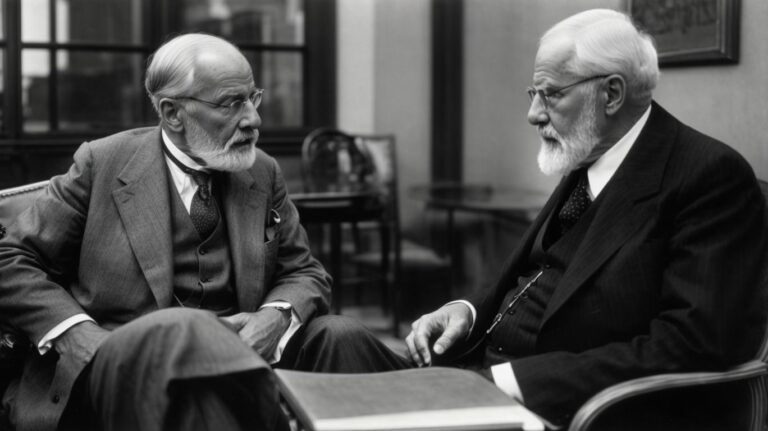Discover the remarkable story of the Father of African American Psychology and his groundbreaking contributions to the field. From developing the theory of self-actualization to advocating for the recognition of African American psychology, his legacy has paved the way for future generations of psychologists.
Explore how his work has impacted society by promoting cultural competence in mental health treatment and challenging racial stereotypes in psychology. Join us as we uncover the inspiring journey of this trailblazing figure and the valuable lessons we can learn from his work.
Contents
- 1 Who is the Father of African American Psychology?
- 2 What Are the Contributions of the Father of African American Psychology?
- 3 What is the Legacy of the Father of African American Psychology?
- 4 How Did the Father of African American Psychology Impact Society?
- 5 What Can We Learn From the Father of African American Psychology?
- 6 Frequently Asked Questions
- 6.1 Who is considered the Father of African American Psychology?
- 6.2 What was Dr. Sumner’s impact on the field of psychology?
- 6.3 How did Dr. Sumner’s work challenge traditional views in psychology?
- 6.4 What obstacles did Dr. Sumner face in his career?
- 6.5 What is the lasting impact of Dr. Sumner’s contributions to psychology?
- 6.6 How can we honor the legacy of Dr. Sumner and other pioneers in African American psychology?
Who is the Father of African American Psychology?
Francis Cecil Sumner, an African-American psychologist and educator, holds the title of the Father of African American Psychology for his groundbreaking work at Howard University.
Sumner was the first African American to receive a Ph.D. in psychology, paving the way for generations of aspiring Black psychologists. His role as an educator at Howard University was instrumental in shaping the field of psychology by emphasizing the importance of cultural factors in mental health.
Sumner’s significant contributions include the establishment of the psychology department at Howard University and his research on race and intelligence, challenging prevalent stereotypes and biases. His legacy continues to inspire future generations of African American psychologists, shaping the landscape of psychology with his pioneering work.
What Are the Contributions of the Father of African American Psychology?
The contributions of Francis Cecil Sumner, the Father of African American Psychology, are deeply embedded in American history, marking a pivotal moment in the advancement of black psychology as a recognized discipline.
Sumner’s groundbreaking work focused on dismantling stereotypes and misconceptions about the intellectual capabilities of African Americans, challenging the prevalent notions prevalent in the early 20th century. His research on the intersection of race and psychology laid the foundation for the emergence of a distinct field dedicated to understanding the unique psychological experiences of Black individuals.
Sumner’s influence extended beyond academia, inspiring future generations of psychologists to address issues of racial inequality and social justice within the field. He advocated for culturally sensitive approaches to therapy and emphasized the importance of acknowledging the impact of societal factors on mental health outcomes.
Development of the Theory of Self-Actualization
One of the key contributions of Francis Cecil Sumner was the development of the Theory of Self-Actualization, a concept that drew from both psychology and Freudian psychoanalysis to explore the complexities of human relationships.
Sumner’s Theory of Self-Actualization delves deep into the innate human drive for personal growth and fulfillment. At its core, this theory posits that individuals are motivated by an inherent desire to achieve their full potential and become the best version of themselves.
Sumner believed that self-actualization involves embracing one’s true authentic self, overcoming obstacles, and striving to reach a state of psychological completeness. By integrating elements of Freudian psychoanalysis, Sumner emphasized the importance of understanding unconscious motivations and exploring the impact of childhood experiences on adult behavior.
This theory has profound implications for understanding human interactions, as it underscores the significance of self-awareness, introspection, and personal development in fostering healthy relationships and emotional well-being. Through self-actualization, individuals can cultivate a deeper understanding of themselves, enhance their interpersonal skills, and navigate life challenges with resilience and authenticity.
Founding the First African American-Oriented Psychology Journal
Francis Cecil Sumner made history by founding the first African American-oriented psychology journal, providing a platform for research and education that centered on the experiences and mental health of black individuals.
Sumner’s initiative was groundbreaking as it not only helped elevate the voices of black psychologists and scholars but also played a pivotal role in highlighting the unique challenges and perspectives within the field of black psychology.
The journal’s establishment marked a significant shift in academia, fostering a more inclusive approach to mental health research and education, shedding light on issues that were previously overlooked.
Through its publication, numerous studies and articles delved into the nuances of black psychology, offering valuable insights that enriched the understanding of mental health within the black community.
Advocating for the Recognition of African American Psychology
Sumner tirelessly advocated for the recognition of African American Psychology, challenging prevailing notions within a predominantly white psychology field and championing the mental health needs and experiences of African Americans.
His advocacy efforts were instrumental in bringing to light the unique perspectives and challenges faced by African Americans in the realm of mental health. Sumner believed that addressing mental health disparities required a deep understanding of the social and cultural factors that influence psychological well-being.
Through his work, he sought to bridge the gap between mainstream psychology and the specific needs of African American communities, emphasizing the importance of cultural competence and sensitivity in therapeutic interventions.
What is the Legacy of the Father of African American Psychology?
The legacy of Francis Cecil Sumner, the Father of African American Psychology, reverberates through academic departments and research initiatives, inspiring future generations and reshaping the landscape of psychology.
Sumner’s pioneering work laid the foundation for the integration of diverse perspectives into the fabric of psychology, emphasizing the importance of understanding and embracing the unique experiences and contributions of individuals from all backgrounds.
His advocacy for research funding in areas related to cultural psychology and the psychology of race and ethnicity sparked a movement towards inclusivity within academic circles, fostering an environment that promoted exploration and innovation in previously overlooked areas of study.
Paving the Way for African American Psychologists
Sumner’s legacy includes paving the way for African American psychologists, nurturing a new generation of faculty and students who navigate challenges and barriers to advance the field of psychology.
Dr. Sumner’s unwavering commitment to diversity and inclusion in psychology led him to play a crucial role in mentoring and supporting African American professionals in the field. He recognized the unique struggles faced by minority students and faculty members, and actively worked to create a supportive environment where they could thrive. By fostering a sense of community and belonging, Sumner’s mentorship had a transformative impact on the next wave of psychologists, give the power toing them to break through societal barriers and make meaningful contributions to the discipline.
Shifting the Focus of Psychology to Include African Americans
By shifting the focus of psychology to include African Americans, Sumner challenged the status quo within professional organizations like the American Psychological Association and reshaped the history of the discipline.
Sumner’s emphasis on inclusivity not only highlighted the need for diverse perspectives within the field but also paved the way for African American professionals to contribute significantly to the narrative of psychology.
His advocacy created a ripple effect that influenced ongoing efforts towards diversity and representation in psychology, inspiring future generations to prioritize inclusivity within academic and professional settings.
Inspiring Future Generations of African American Psychologists
Sumner’s legacy extends to inspiring future generations of African American psychologists, fostering a sense of community and support through initiatives like the Association of Black Psychologists and scholarship programs.
His profound impact on encouraging diversity in psychology is exemplified through his dedicated mentorship programs that aim to uplift aspiring professionals from ethnically diverse backgrounds.
Sumner’s active involvement in organizations such as the ABPsi has played a pivotal role in creating a platform for underrepresented voices to be heard and celebrated within the field. The scholarships he initiated have been instrumental in supporting the educational journeys of numerous aspiring ethnic minority psychologists, providing them with the necessary resources to pursue their dreams and contribute meaningfully to the field of psychology.
How Did the Father of African American Psychology Impact Society?
The Father of African American Psychology, Francis Cecil Sumner, catalyzed a transformation in society by challenging systemic biases, advocating for justice within the justice system, and driving societal change through his scholarship and activism.
Sumner’s groundbreaking work ushered in a new era of understanding and inclusion within the field of psychology. His dedication to reshaping societal perspectives on race and equality paved the way for future generations of scholars and activists.
- As the first African American to receive a Ph.D. in psychology, Sumner shattered barriers and opened doors for marginalized voices in academia.
- His relentless pursuit of justice extended beyond the classroom, influencing policies and practices that aimed to dismantle discrimination and promote fairness within the legal system.
Through his tireless efforts, Sumner not only left a lasting imprint on the field of psychology but also played a pivotal role in the larger quest for social justice and equity.”
Promoting Cultural Competence in Mental Health Treatment
Sumner’s advocacy for multicultural studies and diversity in psychology aimed to address the dark yesterdays of racial disparities in mental health treatment, promoting cultural competence and equity in psychological care.
Plus advocating for multicultural studies, Sumner also emphasized the importance of acknowledging historical injustices and their impact on current mental health disparities. By recognizing the effects of past traumas and discrimination, Sumner sought to foster a more inclusive and sensitive approach to psychological care, ensuring that individuals from all backgrounds receive appropriate and respectful treatment.
This proactive stance on cultural competence and diversity has led to advancements in mental health practices, encouraging therapists and counselors to develop a deeper understanding of diverse cultural perspectives and tailoring treatment plans to meet the unique needs of each individual.
Challenging Racial Stereotypes and Biases in Psychology
Sumner’s work challenged societal racial stereotypes and biases in psychology, paving the way for future generations to recognize the contributions of African American psychologists and embrace a more inclusive and diverse narrative.
In his pioneering efforts, Sumner addressed the prevalent racial biases within psychological frameworks, advocating for a shift towards inclusivity and equity. By actively confronting discriminatory practices and advocating for representation within academia, his work laid the foundation for a more equitable and diverse field of psychology. The significance of acknowledging and amplifying the voices of African American psychologists cannot be overstated, as their contributions not only enrich the discipline but also challenge the status quo, fostering a more comprehensive understanding of human behavior.
Contributing to the Understanding of African American Mental Health
Sumner’s contributions to understanding African American mental health pushed boundaries and comfort zones, leading to transformative initiatives within educational institutions like Lincoln University and the School of Social Sciences.
His groundbreaking work in exploring the intersectionality of race and mental health created a foundation for future research and advocacy efforts in this crucial field. Through his pioneering efforts, Sumner challenged the status quo and opened doors for marginalized voices to be heard and understood.
The initiatives he spearheaded within educational institutions set a new standard for inclusivity and diversity, fostering environments where students and scholars alike could engage in meaningful dialogue and scholarship about African American mental health.
Sumner’s legacy continues to resonate in the academic community, inspiring ongoing conversations and actions that challenge conventional narratives and bring about positive change in the understanding and treatment of mental health within the African American community.
What Can We Learn From the Father of African American Psychology?
The life and work of the Father of African American Psychology, Francis Cecil Sumner, offer invaluable lessons on mentorship, legacy-building, and facing challenges with resilience and perseverance.
Sumner’s mentorship philosophy centered on nurturing the next generation of psychologists, instilling in them a sense of purpose and dedication to advancing the field.
His enduring legacy is evident in the many students he mentored, who went on to make significant contributions to psychology and beyond, carrying forward his teachings and principles.
Sumner’s own life story is a testament to resilience, as he overcame numerous barriers and discrimination to become the first African American to earn a Ph.D. in psychology.
His contributions have paved the way for greater diversity and inclusion in psychology, shaping the discipline into what it is today and leaving a lasting impact on society as a whole.
Frequently Asked Questions
Who is considered the Father of African American Psychology?
The Father of African American Psychology is Dr. Francis Cecil Sumner.
What was Dr. Sumner’s impact on the field of psychology?
Dr. Sumner was the first African American to earn a PhD in psychology and his research focused on the effects of racism and discrimination on mental health. He also paved the way for future generations of African American psychologists.
How did Dr. Sumner’s work challenge traditional views in psychology?
Dr. Sumner’s research challenged the notion that intelligence was solely based on race and showed that environmental and social factors also play a significant role. He also emphasized the importance of cultural diversity in understanding human behavior.
What obstacles did Dr. Sumner face in his career?
As an African American man, Dr. Sumner faced discrimination and limited opportunities in academia and research. He also struggled to find support for his work, facing backlash and criticism from his colleagues.
What is the lasting impact of Dr. Sumner’s contributions to psychology?
Dr. Sumner’s legacy continues to inspire and inform the work of African American psychologists today. His research has shed light on the effects of racism and discrimination on mental health and his determination to succeed despite the challenges he faced serves as a powerful example for future generations.
How can we honor the legacy of Dr. Sumner and other pioneers in African American psychology?
We can honor the legacy of Dr. Sumner and other pioneers by recognizing their contributions and promoting diversity and inclusion in the field of psychology. It is also important to continue their work by addressing systemic issues and advocating for marginalized communities in the field of mental health.



